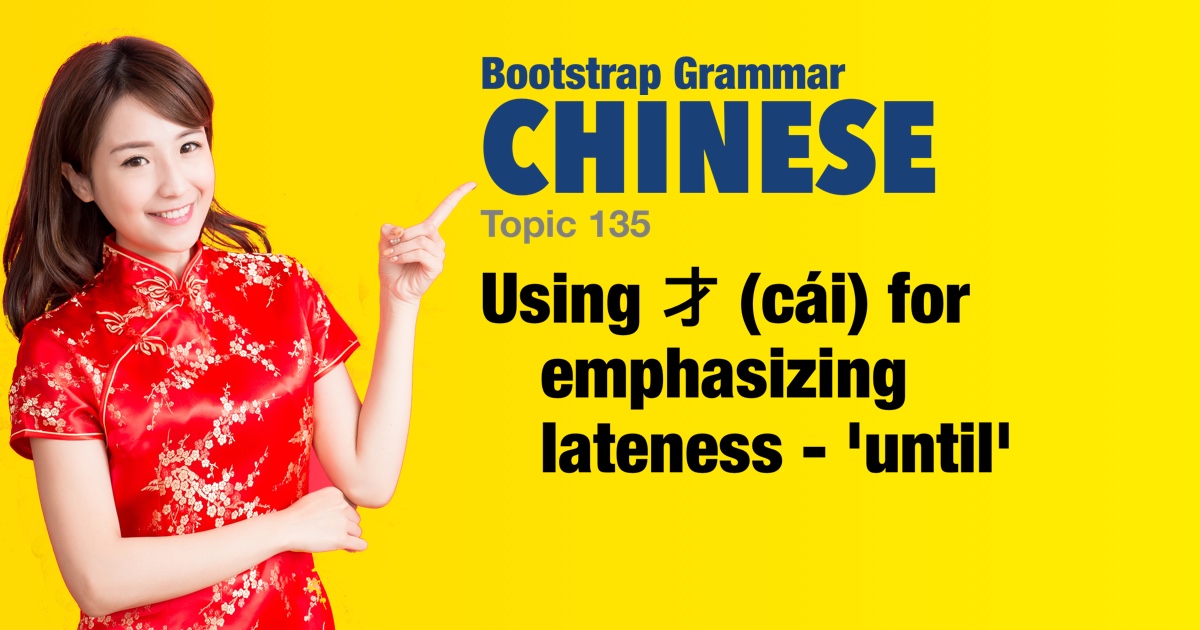Chinese grammar - Using 才 (cái) for emphasizing lateness - 'until' |
|||
|
|||
In Chinese, the particle 才 (cái) can be used to emphasize an action happening later than expected or that an action was delayed. — It is like 'only then' or 'just' or 'not until' in English. The typical pattern is: [subject] + [time] + 才 + [verb] |
| Examples: | |
|
他八点才起床。
tā bā diǎn cái qǐchuáng. He doesn't get up until eight o'clock. |
|
|
我们等了很久,他才来。
wǒmen děng le hěn jiǔ,#tā cái lái. We waited for a long time before he came.
|
|
|
她上个月才搬到这里。
tā shànggè yuè cái bāndào zhèlǐ. She only moved here last month.
|
|
|
你现在才告诉我?
nǐ xiànzài cái gàosu wǒ? You are only now telling me? |
|
|
他昨天晚上十二点才回家。
tā zuótiān wǎnshàng shí'èr diǎn cái huíjiā. He didn't come home until midnight last night. |
|
|
我们等到天黑,他们才回来。
wǒmen děngdào tiānhēi,#tāmen cái huílái. We waited until it got dark before they returned.
|
|
|
他吃了晚饭,才去看电影。
tā chī le wǎnfàn,#cái qù kàn diànyǐng. He only went to the movies after having dinner. |
|
|
你现在才开始学习?
nǐ xiànzài cái kāishǐ xuéxí? You are only now starting to study? |
|
|
我们下个月才放假。
wǒmen xiàgè yuè cái fàngjià. We won't have a holiday until next month.
|
|
|
他八点才出门。
tā bā diǎn cái chūmén. He didn't leave the house until eight o'clock. |
|
|
我们三十分钟才走到那里。
wǒmen sānshí fēnzhōng cái zǒu dào nàlǐ. It took us thirty minutes to walk there. |
|
|
他大学毕业才找到工作。
tā dàxué bìyè cái zhǎodào gōngzuò. He didn't find a job until he graduated from college. |
|
|
你昨天才买的这件衣服?
nǐ zuótiān cái mǎi de zhè jiàn yīfú? You only bought this piece of clothing yesterday? |
|
|
我早上九点才开始工作。
wǒ zǎoshang jiǔ diǎn cái kāishǐ gōngzuò. I didn't start working until nine in the morning. |
|
|
他们很晚才到家。
tāmen hěn wǎn cái dào jiā. They didn't get home until very late. |
|
|
我吃了早饭,才出门。
wǒ chī le zǎofàn,#cái chūmén. I didn't leave the house until I had breakfast. |
|
|
你现在才做作业?
nǐ xiànzài cái zuò zuòyè? You are only doing your homework now? |
|
 |
|



 previous'
previous'